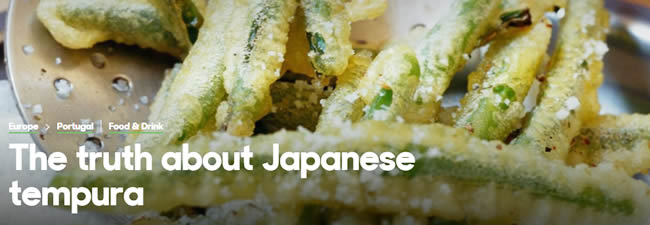今日から「The truth about Japanese tempura -「天ぷらのホントの話」を読んでいます。

In 1543, a Chinese ship with three Portuguese sailors on board was headed to Macau, but was swept off course and ended up on the Japanese island of Tanegashima.
1543年、ポルトガル人船員3人を乗せ、マカオに向かっていた中国の船はコースを外れ、日本の種子島に到着した。
Antonio da Mota, Francisco Zeimoto and Antonio Peixoto – the first Europeans to ever step on Japanese soil – were deemed ‘southern barbarians’ by the locals because of the direction from which they came and their ‘unusual’, non-Japanese features.
アントニオ・ダ・モタ、フランシスコ・ゼイモト、アントニオ・ペイショット – 日本の土を踏んだ初めてのヨーロッパ人 – らは、彼らの出身地と、日本人らしからぬ異形の風貌から、地元の人々に「南部の野蛮人」と見なされた。
barbarian「野蛮人、未開人」。
The Japanese were in the middle of a civil war and eventually began trading with the Portuguese, in general, for guns.
その頃日本人は内乱の真っ最中で、結局ポルトガル人と、主に銃を求めて取引を開始。
civil war「内戦、内乱」。
And thus began a Portuguese trading post in Japan, starting with firearms and then other items such as soap, tobacco, wool and even recipes.
こうして日本にポルトガルとの交易局が開かれ、銃器から始まり、石鹸、タバコ、羊毛、さらには料理のレシピまで持ち込まれるようになった。
The Portuguese remained in Japan until 1639, when they were banished because the ruling shogun Iemitsu believed Christianity was a threat to Japanese society.
ポルトガル人は、将軍家光がキリスト教を日本社会に対する脅威と捉え、彼らを追放する1639年まで日本に留まった。
As their ships sailed away for the final time, the Portuguese left an indelible mark on the island:
ポルトガル人の船が最後に日本を出たとき、彼らはこの島に消えることのない痕跡を残した:
indelible「消えない、忘れられない」。
a battered and fried green bean recipe called peixinhos da horta.
ペイシーニョシュ・ダ・オルタと呼ばれる、衣をつけて揚げたインゲン豆のレシピだ。
Today, in Japan, it’s called tempura and has been a staple of the country’s cuisine ever since.
今日の日本では、天ぷらと呼ばれ、この国を代表する料理となっている。
天ぷら、カステラ、ランドセル・・・ポルトガルがもたらした物は、今もしっかり日本に根付いていますね。
美味しい食事は、外交でも大切な役割を果たすといった話が「ザ・クラウン(英王室が舞台のNETFLIXドラマ)」でも出てきたと思います。
当時の日本人もきっと、揚げたインゲン豆って美味しいーっ!となったんでしょうね(笑)。
ラーメンでもカレーでも納豆スパゲティでも、日本人は「取り入れて作り替える」のが本当に得意というか、好きなんだなあと思います。
美味しい天ぷらのホントの話を、早速見ていきましょう!
理由は単純明快!「少ないコストでしっかり楽しく学べるから」。
私自身の経験(高機能でビックリ)をびっしり書いていますので、良かったら読んでみてください。
下のバナーからどうぞ!






